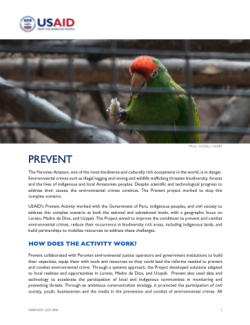The Peruvian Amazon, one of the most biodiverse and culturally rich ecosystems in the world, is in danger. Environmental crimes such as illegal logging and mining and wildlife trafficking threaten biodiversity, forests and the lives of indigenous and local Amazonian peoples. Despite scientific and technological progress to address their causes, the environmental crimes continue. The Prevent project worked to stop this complex scenario.
USAID's Prevent Activity worked with the Government of Peru, indigenous peoples, and civil society to address this complex scenario at both the national and subnational levels, with a geographic focus on Loreto, Madre de Dios, and Ucayali. The Project aimed to improve the conditions to prevent and combat environmental crimes, reduce their occurrence in biodiversity rich areas, including indigenous lands, and build partnerships to mobilize resources to address these challenges.
HOW DOES THE ACTIVITY WORK?
Prevent collaborated with Peruvian environmental justice operators and government institutions to build their capacities, equip them with tools and resources so they could lead the reforms needed to prevent and combat environmental crime. Through a systems approach, the Project developed solutions adapted to local realities and opportunities in Loreto, Madre de Dios, and Ucayali. Prevent also used data and technology to accelerate the participation of local and indigenous communities in monitoring and preventing threats. Through an ambitious communication strategy, it promoted the participation of civil society, youth, businessmen and the media in the prevention and combat of environmental crimes. All Prevent interventions incorporated gender and social inclusion approaches, aiming at the mobilization of private sector resources, civil society engagement, and long-term sustainability interventions.

